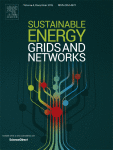
Sustainable Energy Grids & Networks
Scope & Guideline
Transforming Energy Systems for a Sustainable World
Introduction
Aims and Scopes
- Integration of Renewable Energy Sources:
The journal emphasizes research on effective strategies for incorporating renewable energy sources, such as solar and wind, into existing energy grids, ensuring that these systems can operate efficiently and sustainably. - Smart Grid Technologies:
A significant focus is placed on the development and application of smart grid technologies that enhance the operational efficiency and reliability of energy distribution networks. - Energy Management Systems:
Research on energy management systems that optimize the use of energy resources, including demand response strategies and energy storage solutions, is a core area of interest. - Decentralized Energy Systems:
The journal promotes studies on decentralized energy systems, including microgrids and peer-to-peer energy trading models, which empower local communities and enhance energy autonomy. - Cybersecurity in Energy Systems:
Addressing the vulnerabilities and security challenges in energy systems, particularly in the context of increasing digitalization and connectivity, is also a key area of research. - Resilience and Reliability of Energy Grids:
Research that focuses on enhancing the resilience and reliability of energy grids against various disruptions, including natural disasters and cyberattacks, is a critical component of the journal's scope.
Trending and Emerging
- Artificial Intelligence and Machine Learning Applications:
The integration of AI and machine learning in energy systems for predictive analytics, optimization, and fault detection has become a prominent theme, reflecting the industry's shift towards data-driven decision-making. - Electric Vehicle Integration and Management:
Research on the integration of electric vehicles into energy systems, including vehicle-to-grid (V2G) technologies and charging infrastructure management, is increasingly gaining attention as EV adoption rises. - Resilience and Adaptation Strategies:
There is a growing emphasis on resilience strategies for energy systems, particularly in the context of climate change and extreme weather events, highlighting the need for adaptive solutions. - Blockchain and Decentralized Ledger Technologies:
The exploration of blockchain technology for enhancing transparency, security, and efficiency in energy trading and management is an emerging and rapidly gaining interest area. - Smart Energy Communities and Microgrids:
The development of smart energy communities and microgrids that promote local energy production and consumption is trending, reflecting a shift towards localized energy solutions and community empowerment. - Cybersecurity Measures for Energy Systems:
As energy systems become more interconnected and digitalized, research focusing on cybersecurity measures and risk management strategies is increasingly critical, marking a significant trend in the field.
Declining or Waning
- Traditional Energy Systems:
Research focusing solely on traditional energy systems without considering the integration of renewable sources and smart technologies has seen a decline, as the field moves towards more sustainable and innovative solutions. - Conventional Demand Forecasting Methods:
There has been a noticeable decrease in publications related to conventional demand forecasting methods that do not incorporate advanced analytics or machine learning techniques, as the field shifts towards more sophisticated approaches. - Static Grid Management Techniques:
Static management strategies for energy grids, which do not adapt to real-time data and conditions, are becoming less relevant, with a greater focus on dynamic and responsive management systems. - Centralized Energy Systems:
Research centered on centralized energy systems, without considering decentralized approaches or local energy communities, is waning as the focus shifts to more distributed energy models.
Similar Journals

Revue Roumaine des Sciences Techniques-Serie Electrotechnique et Energetique
Advancing knowledge in Electrical and Energy Engineering.Revue Roumaine des Sciences Techniques-Serie Electrotechnique et Energetique is a distinguished journal published by EDITURA ACAD ROMANE, focusing on the vital fields of Electrical and Electronic Engineering and Energy studies. With a notable history since its inception in 1969, this journal serves as a significant platform for disseminating research and advancements in these disciplines, particularly within the context of Romanian and broader European scientific communities. Although it operates on a traditional access model, it maintains relevance with a Q3 quartile ranking as of 2023 in both the Electrical and Electronic Engineering and Energy categories. With its inclusion in Scopus rankings indicating its growing influence, Revue Roumaine des Sciences Techniques actively contributes to the body of knowledge, providing valuable insights and fostering innovations that resonate with researchers, professionals, and students alike. The journal encourages submissions that address contemporary challenges and developments in technology and energy management, facilitating a collaborative exchange of knowledge that is crucial for both academic and practical applications.
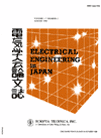
ELECTRICAL ENGINEERING IN JAPAN
Transforming Ideas into Electrical InnovationsELECTRICAL ENGINEERING IN JAPAN is a leading academic journal published by Wiley, dedicated to advancing the field of electrical and electronic engineering as well as energy engineering and power technology. With an ISSN of 0424-7760 and an E-ISSN of 1520-6416, this journal has been a vital resource since its inception in 1968, appealing to a diverse audience including researchers, professionals, and students interested in the latest innovations and developments within the field. Despite currently holding a Q4 ranking in both Electrical and Electronic Engineering and Energy Engineering and Power Technology categories, the journal remains committed to disseminating significant research that contributes to technological advancements. Although it does not offer Open Access options, articles are peer-reviewed to ensure academic rigor and integrity. With each publication, ELECTRICAL ENGINEERING IN JAPAN continues to play an essential role in fostering a deeper understanding of the engineering landscape, ultimately helping to shape the future of electrical engineering on a global scale.

IEEE Open Access Journal of Power and Energy
Unlocking New Frontiers in Electrical and Energy EngineeringIEEE Open Access Journal of Power and Energy is a leading scholarly publication dedicated to advancing research and innovation in the fields of electrical and electronic engineering as well as energy engineering and power technology. Published by the prestigious IEEE-INST ELECTRICAL ELECTRONICS ENGINEERS INC, this fully open-access journal has been a vital resource for the dissemination of impactful findings since its establishment in 2020. With an impressive Q1 ranking in both Electrical and Electronic Engineering and Energy Engineering and Power Technology, it has garnered recognition for its rigorous peer-review process and quality content. Moreover, it ranks favorably within the top percentiles of Scopus, acknowledging its contributions to the global discourse on energy solutions. The journal offers unique access options that encourage broader readership and collaboration among researchers, professionals, and students eager to explore the latest advancements in power and energy systems. Located in the United States, this journal plays an essential role in shaping the future of sustainable energy and technological innovation.

Global Energy Interconnection-China
Pioneering Research in Energy Engineering and Power TechnologyGlobal Energy Interconnection-China is an esteemed Open Access journal published by KEAI PUBLISHING LTD that focuses on the rapidly evolving fields of energy engineering and power technology. Since its launch in 2018, the journal has become a vital resource for researchers and professionals interested in sustainable energy solutions and innovative technologies, addressing the critical challenges facing the global energy landscape. With an impressive Q2 categorization in multiple engineering and energy-related disciplines, the journal ranks highly in Scopus, positioning itself as a leading platform for disseminating impactful research. Specifically, it excels in Automotive Engineering and Control and Systems Engineering, as evidenced by its competitive standing within the top quantiles of its fields. By leveraging its open access model, Global Energy Interconnection-China ensures that high-quality research is accessible to a worldwide audience, fostering collaboration and advancements in renewable energy, sustainability, and environmental conservation. For researchers, professionals, and students alike, this journal serves as a pivotal forum for sharing insights and innovations that shape the future of energy interconnection.
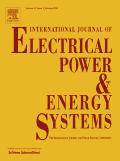
INTERNATIONAL JOURNAL OF ELECTRICAL POWER & ENERGY SYSTEMS
Advancing the Future of Electrical EngineeringINTERNATIONAL JOURNAL OF ELECTRICAL POWER & ENERGY SYSTEMS, published by ELSEVIER SCI LTD, stands at the forefront of electrical and energy engineering research, boasting an exceptional impact factor and recognition as a Q1 journal in both Electrical and Electronic Engineering and Energy Engineering and Power Technology as of 2023. Since its inception in 1979, this prestigious journal has dedicated itself to advancing the field through rigorous peer-reviewed articles, fostering innovation and collaboration among researchers, professionals, and students. With a commendable Scopus ranking—#60 in Electrical Engineering and #28 in Energy Engineering—this journal serves as an essential platform for disseminating groundbreaking findings and methodologies. Beginning in 2024, it will embrace Open Access, thereby expanding its reach and accessibility to a global audience, reinforcing its commitment to sharing knowledge and driving progress in sustainable energy systems.
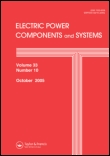
ELECTRIC POWER COMPONENTS AND SYSTEMS
Advancing the Future of Electric Power EngineeringELECTRIC POWER COMPONENTS AND SYSTEMS is a respected peer-reviewed journal dedicated to advancing the field of electrical and electronic engineering, energy engineering, and power technology. Published by Taylor & Francis Inc, this journal boasts a dynamic scope that encompasses a wide array of topics relevant to power systems, including renewable energy, power distribution, and component reliability. With an impact factor indicative of its ongoing contribution to research, it ranks in the Q3 category across multiple engineering disciplines according to the latest metrics. Researchers and professionals will find this journal an invaluable resource, offering insights into the latest developments and innovations in electric power systems from its inception in 2000 to the current era and beyond. Accessible online with Open Access options, it caters to both established experts and emerging scholars looking to deepen their knowledge and foster collaboration within this critical field.
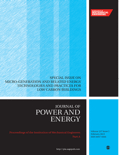
PROCEEDINGS OF THE INSTITUTION OF MECHANICAL ENGINEERS PART A-JOURNAL OF POWER AND ENERGY
Empowering Research for a Sustainable FuturePROCEEDINGS OF THE INSTITUTION OF MECHANICAL ENGINEERS PART A-JOURNAL OF POWER AND ENERGY, published by SAGE PUBLICATIONS LTD, is a pivotal journal dedicated to advancing the fields of mechanical engineering and energy technology. With a history spanning from 1983 to 2024, this journal provides a respected platform for researchers and practitioners to disseminate findings that address contemporary challenges in power generation, energy efficiency, and sustainable engineering practices. As evidenced by its quarter ranking in Q3 within the categories of Energy Engineering and Power Technology, and Mechanical Engineering, it serves as a significant resource for academics aiming to enhance their understanding and explore innovation in these critical areas. While currently not an open-access journal, the research published here is invaluable for both ongoing education and professional practice, making it an essential read for anyone engaged in the engineering disciplines.

Smart Energy
Advancing the Frontier of Energy Research and SustainabilitySmart Energy, an esteemed publication by ELSEVIER, stands at the forefront of energy research, exploring innovative solutions and sustainability practices in the energy sector. With an impressive Open Access model since its inception in 2021, this journal has rapidly established itself as a vital resource for researchers and professionals alike, providing unrestricted access to high-quality peer-reviewed articles. Positioned in the Q1 category across multiple fields, including Energy Engineering and Power Technology, Renewable Energy, and Management, Monitoring, Policy and Law, Smart Energy demonstrates a strong commitment to advancing knowledge in the energy domain. Registered under the ISSN 2666-9552, it garners significant attention, ranking within the top ranges of Scopus metrics across various disciplines. The journal continuously aims to bridge the gap between academic research and practical application, making it an essential outlet for scholars and practitioners dedicated to fostering sustainable energy solutions worldwide. Located in the United Kingdom, Smart Energy is shaping the future of energy management from its publishing base in Amsterdam, the Netherlands.

INTERNATIONAL JOURNAL OF ENERGY RESEARCH
Exploring the frontiers of energy engineering and policy.INTERNATIONAL JOURNAL OF ENERGY RESEARCH (ISSN: 0363-907X; E-ISSN: 1099-114X), published by Wiley-Hindawi, stands at the forefront of energy research, offering a scholarly platform pivotal for advancing knowledge in the fields of energy engineering, nuclear energy, fuel technology, and renewable energy systems. With an impressive Q1 and Q2 ranking across several categories as of 2023, this journal reflects a commitment to high-quality, peer-reviewed research that addresses both theoretical and practical challenges in the energy sector. Now an Open Access journal since 2023, it enhances accessibility and dissemination of cutting-edge research to a global audience. Located in the United Kingdom, with an active publication history dating back to 1977, the journal aims to contribute to sustainable energy solutions and innovative technologies. Researchers, professionals, and scholars will find valuable insights and discussions here, bridging gaps in energy research and policy-making.

Smart Grids and Sustainable Energy
Pioneering Research for Smart Energy SystemsSmart Grids and Sustainable Energy, published by SPRINGER NATURE, is a pivotal open-access journal dedicated to advancing the knowledge and application of smart grid technologies and sustainable energy solutions. Serving as a key resource in the fields of Economics and Econometrics, Electrical and Electronic Engineering, and Energy Studies, this journal aims to facilitate interdisciplinary collaboration and innovation. With a commendable Q2 ranking in multiple categories as of 2023, including a top percentile placement in Economics and Econometrics and Electrical Engineering, the journal underscores its significance in driving forward research that combines economic viability with technological advancement. Researchers, professionals, and students will find a wealth of scholarly articles designed to expand understanding of the complex interplay between energy systems, sustainability, and economic factors. For those interested in cutting-edge research with high visibility due to its open-access policy, Smart Grids and Sustainable Energy is an essential addition to the academic landscape.